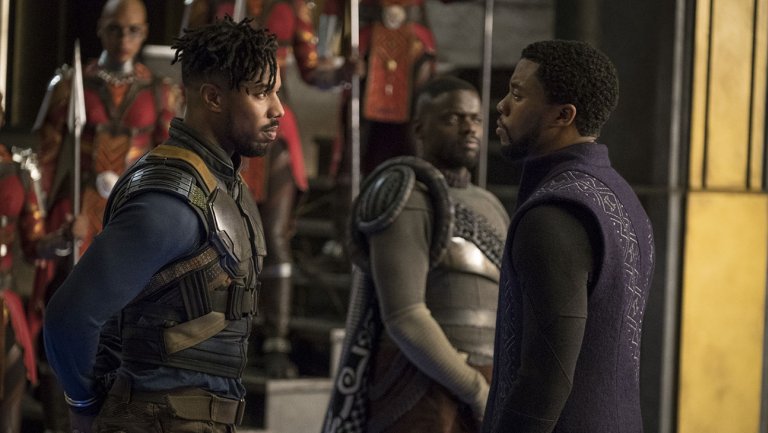T’Challa was shown to be a stoic and upright individual, dedicated to justice but capable of mercy. He’s worthy of admiration, but not dramatically interesting. Coogler recognizes this, and makes Erik into a stealth protagonist. The film begins with his origin story as a young boy, finding his father dead and left alone as a mysterious ship flies off into the night. By the time he reemerges as an adult, Jordan’s trademark toughness masking a barely-hidden vulnerability is put to good use, just as it was in his and Coogler’s previous collaborations in Creed and Fruitvale Station. His Erik is certainly the most compelling character onscreen, a further patch on Marvel’s difficulty in constructing memorable villains. Spider-Man: Homecoming’s Vulture, played by Michael Keaton, was their first recognizable villain, if not a sympathetic one. Erik is both recognizable and sympathetic, so much so that the film is forced to take clumsy pains to show his amoral ruthlessness lest the audience be too much on his side.
Marvel, to its great credit, has avoided the portentousness of its comic rival DC, but with its last several entries, it has still managed to address real contemporary questions and dilemmas. Black Panther is a battle of individuals for a fictional throne, but it’s also a war of philosophies and political dichotomies. T’Challa represents tradition and a loyalty to history and tribe. He demonstrates the power and unifying vision that’s present when everyone agrees on a set of values and culture. Erik’s vision is broader, shunning man-made borders and seeing common struggle in all people everywhere, or at least anyone linked to the African diaspora. He posits that the ability to stop an evil like slavery and a choice to not use that ability makes one complicit in the evil. Coogler, who wrote the script with Joe Robert Cole, puts his nickel on Erik’s side by the simple act of letting the antagonist make a decent point.
Where Coogler leaves Erik is in what’s to be done with the power to secure, as Wakandans have always done, and the power to dominate, which they have chosen to eschew. A vision that T’Challa has of his father T’Chaka (John Kani) eludes to a personal favorite historical quote, from French revolutionary Antoine St. Just during the trial of King Louis XVI. T’Chaka’s ‘it is hard for a good man to be king’ certainly rhymes with St. Just’s ‘one cannot reign innocently.’ T’Challa and Erik would both reign, leaving Wakanda in its traditional place or elevating it to loom over a larger portion of the world. The third way tempting T’Challa is the dilution of his power by using it to empower others who didn’t have the good fortune of a meteor landing in their ancestral backyard. This thinking is represented by Nakia (Lupita Nyong’o), a Wakandan spy, love interest for T’Challa, and a person who spends time in the outside world and sees all that Wakanda could do if it was so inclined. This level of political theory is so much more than is required from a superhero film, but the film is never weighed down with speechifying that halts Black Panther in its tracks. Coogler and Cole thread their themes and debates seamlessly into the proceedings, putting them alongside light humor and plot mechanics.
No two-hander between Boswick and Jordan, Black Panther has the kind of cast of characters that any film would be envious of. One has to go several names down the cast list before finding a character that doesn’t make an impression as a complete individual. Coogler made Jordan into a star with their earlier collaborations and he does the same with Winston Duke and Letitia Wright. The former plays M’Baku, a sullen chief of a rival tribe who reigns from the best set in the film, and the latter plays Shuri, T’Challa’s brilliant and boisterous sister who essentially functions as Wakanda’s CTO. Both are pure scene-stealers who must go on to bigger and better roles. Angela Bassett is her stalwart self as T’Challa’s resilient mother and Nyong’o finally gets a role that reminds the viewer that her 12 Years a Slave breakout was no fluke. Daniel Kaluuya plays a chieftain amenable to Erik’s message, Andy Serkis is unhinged as an arms dealer hungry for vibranium, Martin Freeman plays a CIA agent realizing how out of his depth he is in Wakanda, and Danai Gurira’s bodyguard Okoye is an immovable object with a heart of gold, adept with both spear and wig. One has to get all the way down to Forest Whittaker’s high priest to find a character who isn’t differentiating himself from a type, in his case the wise elder. There’s no other branch of the MCU so immediately skilled at building out a new part of the world with such indelible characters.
Where Black Panther falls behind is in its action. Excepting a Busan car chase, the wow factor in the film is less from fight choreography than it is imagination. Coming off of Creed with its incredible one-shot boxing matches, more was expected from Coogler. Black Panther can’t quite be all things to all filmgoers, but it remains a big step forward for Marvel, culturally and intellectually. It represents more mature storytelling while losing none of the inherent charm that has made the MCU so consistently successful, all while opening up a larger segment of the population to be able to see themselves in the characters and making a serious and credible play for a Best Costume/Production Design Oscar. This MCU bottle episode has a beautiful, hand-crafted ship inside of it. B+

 RSS Feed
RSS Feed